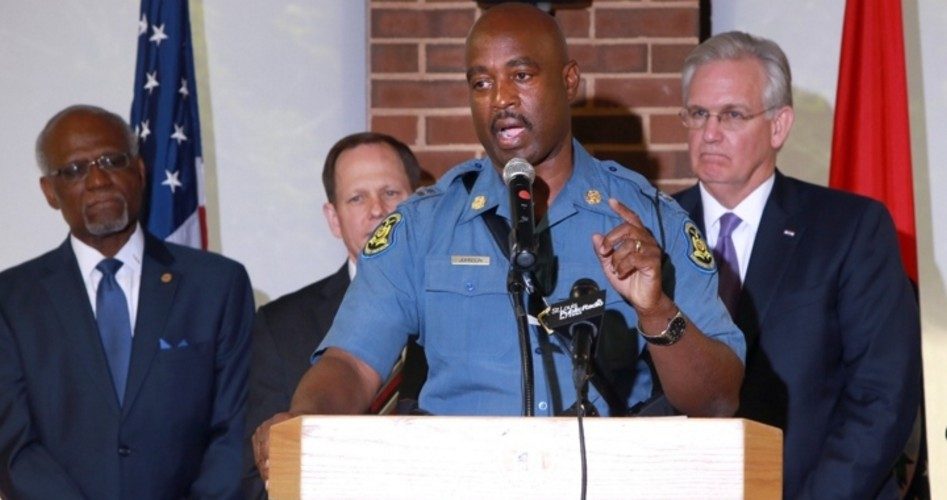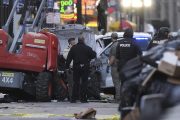
Thursday brought greater calm to the St. Louis suburb of Ferguson after Missouri Governor Jay Nixon requested St. Louis County Police stand down from their role in maintaining safety during the ongoing protests over Saturday’s shooting of Michael Brown by a police officer.
Nixon ordered the Missouri Highway Patrol to take over the responsibility of crowd control, headed by Captain Ronald S. Johnson (shown), a Ferguson native. The change in the environment under Johnson’s direction was stunning and almost immediate, after the previous four nights, when the protests turned violent and were met by a heavy-handed police response with SWAT teams, tear gas, sniper posts, and armored vehicles.
As reported by the Washington Post:
Not only did Johnson march with the protesters, but he vowed to not blockade the street, to set up a media staging center, and to ensure that residents’ rights to assemble and protest were not infringed upon. Officers working crowd control, he said, have been told they must take off their gas masks.
“I’m not afraid to be in this crowd,” Johnson told the Post.
Johnson, who is black, joined the Highway Patrol in 1987. He has been with the patrol for 26 years, and served for the last 12 as commanding officer of the patrol’s Troop C, which covers the 11-county St. Louis region, according to the St. Louis Post-Dispatch.
St. Louis Police Chief Sam Dotson spoke favorably of Johnson being asked to handle the Ferguson protests, telling the Post-Dispatch:
I’ve worked with him for many years, even before I was chief. You couldn’t have a better partner for the region. He’s smart, he’s professional, he comes from the area….
[He] understands urban policing and the challenges we have. He’s low-profile, but not afraid to take on the tough jobs.
At a press conference this morning, Johnson answered questions and gave some of his own comments on the situation in Ferguson.
“He wants to make sure that people in Ferguson are safe and have the right to speak their mind, and that’s what we’re tasked to do,” Johnson said of Governor Nixon’s decision to place the Highway Patrol in Ferguson. Johnson also noted that the police used no tear gas during Thursday night’s protests: “Last night was a great night,” he told the press.
As noted by CBS St. Louis, Johnson offered some good perspective on the protests: “In our anger, we have to make sure that we don’t burn down our own house. This is not a black and white issue. We all have sons and daughters. We all have to communicate better.”
This change in tactics in Ferguson certainly brings a welcome change of scenery from the last several days, which saw behavior on both sides that brought outrage to people across the country. Much of the outrage, of course, was directed at the police response.
As Senator Rand Paul (R-Ky.) remarked in an August 14 Time op-ed:
The outrage in Ferguson is understandable — though there is never an excuse for rioting or looting. There is a legitimate role for the police to keep the peace, but there should be a difference between a police response and a military response.
The images and scenes we continue to see in Ferguson resemble war more than traditional police action.
The militarization of our law enforcement is due to an unprecedented expansion of government power in this realm. It is one thing for federal officials to work in conjunction with local authorities to reduce or solve crime. It is quite another for them to subsidize it.
When you couple this militarization of law enforcement with an erosion of civil liberties and due process that allows the police to become judge and jury — national security letters, no-knock searches, broad general warrants, pre-conviction forfeiture — we begin to have a very serious problem on our hands.
Given these developments, it is almost impossible for many Americans not to feel like their government is targeting them. Given the racial disparities in our criminal justice system, it is impossible for African-Americans not to feel like their government is particularly targeting them.
Americans must never sacrifice their liberty for an illusive and dangerous, or false, security. This has been a cause I have championed for years, and one that is at a near-crisis point in our country.
Senator Paul’s views are representative of a growing number of Americans who are becoming increasingly disturbed by the militarization of local police forces. Freedom-loving citizens must get involved in this fight to keep local police independent of federal control. Americans must also be careful to elect local officials who understand the importance of a locally controlled police force run by a Sheriff who is elected and accountable to the community.
Photo of Highway Patrol Captain Ronald S. Johnson at a press conference: AP Images




